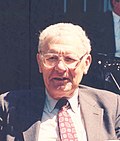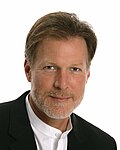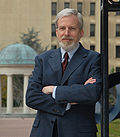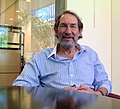List of systems scientists
Jump to navigation
Jump to search
This is a list of systems scientists, people who made notable contributions in the field of the systems sciences:[1]
A[edit]
- Russell L. Ackoff (1919) is an American scientist in the field of management science, operations research and systems theory.
- Genrich Altshuller (1926–1998) was a Russian engineer and scientist, and inventor of the Theory of Inventive Problem Solving.
- Pyotr Anokhin (1898–1974) was a Russian biologist and physiologist who made important contributions to cybernetics and functional systems.
- Leo Apostel (1925–1995) was a Belgian philosopher who advocated of interdisciplinary research between exact science and humanities.
- W. Brian Arthur (1945), is an Irish economist, is an expert on economics and complexity theory in technology and financial markets, and other applications.
- W. Ross Ashby (1903–1972) was an English psychiatrist and a pioneer field of complex systems.
B[edit]
- Per Bak (1948–2002) was a Danish theoretical physicist, to whom is attributed the development of the concept of self-organized criticality.
- Bela H. Banathy (1919–2003) was a Hungarian systems scientist, design scientist, educator, author and coordinator of many international systems research conferences.
- Béla A. Bánáthy (1946?) is an American systems scientist, who works at the International Systems Institute at the Saybrook Graduate School.
- Yaneer Bar-Yam (1959) is an American physicist, systems scientist and founding president of the New England Complex Systems Institute.
- Gregory Bateson (1904–1980) was a British anthropologist, social scientist, linguist, and cyberneticist whose work intersected that of many other fields.
- Kenneth D. Bailey (1943) is an American sociologist, who worked in the field of research methods, systems theory and environmental demography and ecology.
- Stafford Beer (1926–2002) was a British management scientist, known for his work in the fields of operational research and management cybernetics.
- Harold Stephen Black (1898–1983) was an American electrical engineer, who revolutionized the field of applied electronics by inventing the negative feedback amplifier in 1927.
- Alexander Bogdanov (1873–1928) was a Russian physician, philosopher, economist, science fiction writer, and revolutionary.
- Kenneth E. Boulding (1910–1993) was a British economist, educator, peace activist, poet, religious mystic, devoted Quaker, systems scientist, and interdisciplinary philosopher.
- Murray Bowen (1913–1990) was an American psychiatrist and pioneers of family therapy and systemic therapy.
- Valentino Braitenberg (1926-2011) was a German neurologist and cyberneticist and pioneer in embodied cognitive science.
- Richard Peirce Brent (1946) is an Australian mathematician and computer scientist who is known for Brent's method of root finding.
- Gerrit Broekstra (1941) is a Dutch scientist and professor of organizational behavior and systems sciences.
- Walter F. Buckley (1922–2006) was an American sociologist, and among the first to apply General systems theory to sociology.
C[edit]
- Donald T. Campbell (1916–1996) was an American social scientist, who coined the term evolutionary epistemology.
- Peter Checkland (1930) is a British management scientist, who developed soft systems methodology.
- Harold Chestnut (1918–2001) was an American electrical engineer and, who wrote some classic books about systems engineering.
- C. West Churchman (1913–2004) was an American philosopher in the field of management science, operations research and systems thinking.
- James J. Collins is an American bioengineer and MIT professor. He is one of the founders of the emerging field of synthetic biology, and a pioneering researcher in systems biology, stochastic resonance, biological dynamics and neurostimulation.
- Gerhard Chroust (1941) is an Austrian systems scientist, and Professor Emeritus for Systems Engineering and Automation at the Institute of System Sciences at the Johannes Kepler University of Linz, Austria.
D[edit]
- Vladimir Damgov (1947–2006) was a Bulgarian physicist, mathematician, union leader and parliamentarian, who particularly contributed to the application of chaos theory.
- Herman Daly (1938) is an American ecological economist and steady-state theorist.
- George Dantzig (1914–2005) was an American mathematician who is considered the "father of linear programming".
E[edit]
- David Easton (1917) is a Canadian political scientist, who developed application of systems theory to political science.
- Frederick Edmund Emery (1925–1997) was an Australian psychologist, and pioneers in the field of Organizational development.
- Hugo O. Engelmann (1917–2002) was an American sociologist, anthropologist and general systems theorist.
- Joshua M. Epstein is an American expert in social and economic dynamics, and member of the Santa Fe Institute.
- Hugh Everett (1930–1982) was an American physicist, who developed the use of generalized lagrange multipliers in operations research.
F[edit]
- J. Doyne Farmer (1952) is an American physicist, and one of the founding fathers of chaos theory.
- Mitchell Feigenbaum (1944) is an American mathematical physicist whose pioneering studies in chaos theory led to the discovery of the Feigenbaum constants.
- Peter C. Fishburn (1936) is an American scientist known as a pioneer in the field of decision making processes.
- Irmgard Flügge-Lotz (1903–1974) was a German-American mathematician who developed the theory of discontinuous automatic control systems and laid the foundation for automatic on-off aircraft control in jets
- Heinz von Foerster (1911–2002) was an Austrian-American scientist combining physics and philosophy. Together with Warren McCulloch, Norbert Wiener, and John von Neumann, Heinz von Foerster was the architect of cybernetics.
- Jay Forrester (1918–2016) was an American computer engineer, known as founder of System Dynamics, which deals with the simulation of interactions between objects in dynamic systems.
- Charles François (1922) is a Belgian specialist in the field of cybernetics and systems science, known as founding editor of the International Encyclopedia of Systems and Cybernetics
- Christian Fuchs (1976) is an Austrian social scientist who focuses his research on information society theory, social theory, critical theory.
- Buckminster Fuller (1895–1983) was an American visionary, designer, architect, poet, author, and inventor. He was one of the first to propagate a systemic worldview and explored principles of energy efficiency and material efficiency in the fields of architecture, engineering and design.
G[edit]
- Murray Gell-Mann (1929) is an American physicist and Nobel Prize winner in physics for his work on the theory of elementary particles.
- Ralph Waldo Gerard (1900–1974) was an American neurophysiologist and behavioral scientist and one of the founders of the Society for General Systems Research.
- Jamshid Gharajedaghi (c. 1940), American organizational theorist, management consultant, and Adjunct Professor of Systems thinking
- Tom Gilb (1940) is an American systems engineer.
- Harry H. Goode (1909–1960) was an American computer engineer and systems engineer and professor at University of Michigan. Until his death his was president of the National Joint Computer Committee (NJCC). He wrote the famous System Engineering Handbook together with Robert Engel Machol.
- Brian Goodwin (1931) is a Canadian mathematician and biologist
- Barbara J. Grosz is an American computer scientist who developed the SharedPlans model for collaborative planning in multi-agent systems
H[edit]
- Arthur David Hall III (1925–2006) was an American electrical engineer. He worked for years at Bell Labs. He was one of the founders of the (IEEE) and was among the first general systems theorists. He wrote A methodology of Systems Engineering from 1962.
- Stephen G. Haines (1945) is an American organizational theorist and management consultant.
- Debora Hammond is an American historian of science and a systems scientist.
- Albert Hanken (born 1926) Dutch mathematician and Emeritus Professor Systems theory at the University of Twente.
- Friedrich Hayek (1899–1992) was a Nobel prize economist and a philosopher who made pioneering contributions to complexity theory. He notably wrote The Theory of Complex Phenomena (1967).
- Francis Heylighen (1960) is a Belgian cybernetician working on self-organization and the evolution of complex systems
- Derek Hitchins (1935) is a British systems engineer and was professor in engineering management, in command & control and in systems science at the Cranfield University, Bedfordshire, England.
- John Henry Holland (1929) is an American pioneer in complex system and nonlinear science. He is known as the father of genetic algorithms.
J[edit]
- Michael C. Jackson (1951) is a British systems scientist, and expert in Systems Thinking, Organizational Cybernetics, Creative Problem Solving and Critical Systems Thinking.
- Gwilym Jenkins (1933–1982) was a British statistician and systems engineer
- Clarence Johnson (1910–1990) was an American aircraft engineer and aeronautical innovator.
K[edit]
- Rudolf Emil Kalman (1930) is an American-Hungarian mathematical system theorist, who is an electrical engineer by training.
- J. A. Scott Kelso (1947) is an Irish neuroscientist, who in 1985 he founded the Center for Complex Systems and Brain Sciences.
- Faina Mihajlovna Kirillova (1931) is a Belarusian control theorist and former Department Head of the Institute of Mathematics of the National Academy of Sciences of Belarus. Author of over 350 scientific papers and monographs about optimal control theory.
- George Klir (1932) is a Czech-American computer scientist and professor of systems sciences at the Center for Intelligent Systems at the Binghamton University in New York. Author of several texts on systems, including Architecture of Systems Problem Solving.
- Klaus Krippendorff (1932) is a German cyberneticist, working on the mathematical foundations of cybernetics, general systems, communication and information theories.
L[edit]
- Christopher Langton (1949) is an American biologist and one of the founders of the field of artificial life.
- Ervin László (1932) is a Hungarian philosopher of science, systems theorist, integral theorist, and classical pianist.
- Ton de Leeuw (1941) Dutch organizational theorist.
- Loet Leydesdorff (1948) is a Dutch sociologist and cyberneticist, known for his work sociology of communication and innovation.
- Edward Norton Lorenz (1917) is an American mathematician and meteorologist, and an early pioneer of the chaos theory.
- Niklas Luhmann (1927–1998) was a German sociologist, who developed a systems theory applicable in political science from Talcott Parsons works.
M[edit]
- Robert Engel Machol (1917–1998) was an American systems engineer and expert in the fields of operations research
- Humberto R. Maturana (1928)
- Warren McCulloch (1899–1969)
- Donella Meadows (1941–2001) was an American environmental scientist, known as lead author of Limits to Growth
- Dennis Meadows (1942) is an American economist and systems scientist, known as coauthor of Limits to Growth
- Mihajlo D. Mesarovic
- Margaret Mead (1901–1978)
- Gary Metcalf (1957) is an American organizational theorist and president of the International Federation for Systems Research (2010–)
- James Grier Miller (1916)
- Melanie Mitchell is an American scientist
- Edgar Morin (1921) is a French philosopher and sociologist
- Elon Musk (1971) is a South African Engineer, Rocket Systems Designer and co-chairman of OpenAI
N[edit]
- John von Neumann (1903–1957),
O[edit]
- Eugene Odum (1913–2002) was an American scientist known for his pioneering work on ecosystem ecology.
- Howard Thomas Odum (1924–2002) was an American ecosystem ecologist.
- Linda Olds (1946?) is an American psychologist and pioneer in the field of systems psychology.
- David Orrell is a Canadian mathematician.
P[edit]
- Bradford Parkinson is an American systems engineer
- Talcott Parsons (1902–1979)
- Gordon Pask (1928–1996)
- Samuel C. Phillips (1921–1990) was an officer in the U.S. Air Force
- Ilya Prigogine (1917–2003)
- Peter Pruzan (1937) Danish organizational theorist
R[edit]
- Simon Ramo (1913) is an American physicist, engineer, and business leader.
- Anatol Rapoport (1911–2007) was a Russian mathematician, psychologist and systems scientist. He is cofounder of the International Society for Systems Science.
- Eberhardt Rechtin (1926–2006) was an American systems engineer and respected authority in aerospace systems and systems architecture.
- Barry Richmond (1947–2002) was an American systems scientist,
- Luis M. Rocha (1966) is a Portuguese-American systems thinker,
- Robert Rosen (1943) is an American biologist and systems thinker
S[edit]
- Andrew P. Sage (1933) American systems engineer and Emeritus Professor and Founding Dean Emeritus at the School of Information Technology and Engineering of the George Mason University.
- Claude Shannon (1916–2001)
- Thomas B. Sheridan (1931) is American mechanical engineering and pioneer of robotics and remote control technology.
- Herbert A. Simon (1916–2001)
- Ulbo de Sitter (1930–2010) Dutch sociologist and Professor of business administration at the Radboud University Nijmegen
- Henk G. Sol (1951) is a Dutch organizational theorist, consultant
- Georgiy Starostin (1976) is a Russian linguistics researcher at and a participant at the Santa Fe Institute's Evolution of Human Languages project.
- Sytse Strijbos (1944) is a Dutch academic, lecturer of Philosophy of technology at the Vrije Universiteit in Amsterdam
T[edit]
- Arnold Tustin, (1899–1994), was a British engineer.
- Jaan Tallinn (1972), co-developer of the original Skype distributed system, co-founder of the Future of Life Institute and Centre for the Study of Existential Risk, accredited/trained Physicist
U[edit]
- Stuart A. Umpleby (1944) is an American cyberneticist working in the field of cross-cultural management, cybernetics, group facilitation methods, systems science and the use of computer networks.
V[edit]
- Francisco J. Varela (1945–2001)
- Jan in 't Veld (1925–2005) Dutch aerospace engineer and organizational theorist
- Geoffrey Vickers (1894–1982)
- Ludwig von Bertalanffy (1901–1972) was an Austrian Canadian biologist, fysiologist and systems scientist, and cofounder of the International Society for Systems Science
W[edit]
- John Nelson Warfield (1928(?)) is an American electrical engineering and systems scientist, and member of the Academic Committee of the International Encyclopedia of Systems and Cybernetics.
- Kevin Warwick (1954) is a British Cybernetician with interests in artificial intelligence, robotics, control systems and biomedical engineering, especially implant technology.
- Duncan J. Watts is an American professor of sociology
- Paul Watzlawick (1921–2007),
- Geoffrey West (1940) is a British physicist.
- Douglas R. White (1942) is an American complexity researcher, social anthropologist and sociologist.
- Brian Wilson is a British systems scientist, known for his development of Soft systems methodology.
- Stephen Wolfram (1959) is English theorist known for his work in theoretical particle physics, cellular automata, complexity theory, and computer algebra.
- A. Wayne Wymore (1927) is an American mathematician and systems engineer. Founder and first Chairman of Systems and Industrial Engineering (SIE) Department at the University of Arizona.
- Warren Weaver (1894–1978) was an American mathematician and communication scientist.
- Norbert Wiener (1894–1964) was an American mathematician and one of the founders of cybernetics.
X[edit]
Y[edit]
Z[edit]
- Lotfi Asker Zadeh
- Erik Christopher Zeeman (1925) is a Japanese-born British mathematician known for work in geometric topology and singularity theory.
- Gerard de Zeeuw (1936) is a Dutch scientist and professor Mathematical modelling of complex social systems at the University of Amsterdam in the Netherlands.
See also[edit]
References[edit]
- ^
This list is based on the following sources:
- ASC cybernetics, A history of cybernetics, website 2007.
- Charles François, Systemics and cybernetics in historical perspective, in: Systems Research and Behavioral Science, jaargang 16, p. 203–219, 1999
- ISSS, Luminaries of the Systemics Movement Archived 2007-08-20 at the Wayback Machine, webpage, 2007/06/10.
- Principia Cybernetica, list of cybernetic and systems scientists, website 2007.
- The Wikipedia articles in the field of systems, systems science and systems theory. For example: catastrophe theory, chaos theory, complex adaptive system, complex systems, control theory, cybernetics, ecosystem ecology, multi-agent system, systems biology, systems ecology, systems engineering and systems theory.
- Other notable sources, listed separately.
External links[edit]
| Wikimedia Commons has media related to Systems scientists. |
- Collaborative projects of the ISSS with a lot of information about the field of systems science.
- Principia Cybernetica website.
- A history of cybernetics











